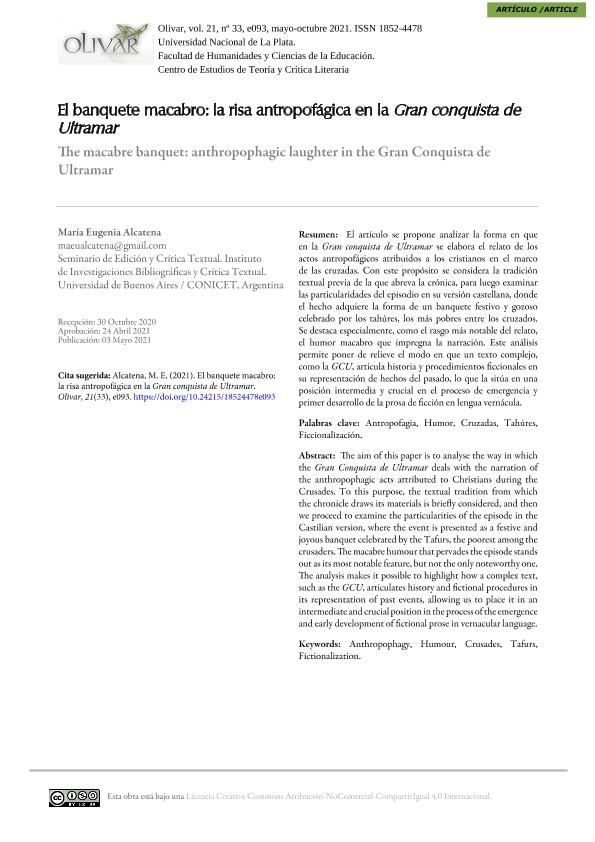Mostrar el registro sencillo del ítem
dc.contributor.author
Alcatena, María Eugenia

dc.date.available
2022-10-06T13:54:12Z
dc.date.issued
2021-05
dc.identifier.citation
Alcatena, María Eugenia; El banquete macabro: la risa antropofágica en la Gran conquista de Ultramar; Universidad Nacional de La Plata. Facultad de Humanidades y Ciencias de la Educación. Centro de Estudios de Teoría y Crítica Literaria; Olivar; 21; 33; 5-2021; 1-10
dc.identifier.issn
1852-4478
dc.identifier.uri
http://hdl.handle.net/11336/172208
dc.description.abstract
El artículo se propone analizar la forma en que en la Gran conquista de Ultramar se elabora el relato de los actos antropofágicos atribuidos a los cristianos en el marco de las cruzadas. Con este propósito se considera la tradición textual previa de la que abreva la crónica, para luego examinar las particularidades del episodio en su versión castellana, donde el hecho adquiere la forma de un banquete festivo y gozoso celebrado por los tahúres, los más pobres entre los cruzados. Se destaca especialmente, como el rasgo más notable del relato, el humor macabro que impregna la narración. Este análisis permite poner de relieve el modo en que un texto complejo, como la GCU, articula historia y procedimientos ficcionales en su representación de hechos del pasado, lo que la sitúa en una posición intermedia y crucial en el proceso de emergencia y primer desarrollo de la prosa de ficción en lengua vernácula.
dc.description.abstract
The aim of this paper is to analyse the way in which the Gran Conquista de Ultramar deals with the narration of the anthropophagic acts attributed to Christians during the Crusades. To this purpose, the textual tradition from which the chronicle draws its materials is briefly considered, and then we proceed to examine the particularities of the episode in the Castilian version, where the event is presented as a festive and joyous banquet celebrated by the Tafurs, the poorest among the crusaders. The macabre humour that pervades the episode stands out as its most notable feature, but not the only noteworthy one. The analysis makes it possible to highlight how a complex text, such as the GCU, articulates history and fictional procedures in its representation of past events, allowing us to place it in an intermediate and crucial position in the process of the emergence and early development of fictional prose in vernacular language.
dc.format
application/pdf
dc.language.iso
spa
dc.publisher
Universidad Nacional de La Plata. Facultad de Humanidades y Ciencias de la Educación. Centro de Estudios de Teoría y Crítica Literaria
dc.rights
info:eu-repo/semantics/openAccess
dc.rights.uri
https://creativecommons.org/licenses/by-nc-sa/2.5/ar/
dc.subject
ANTROPOFAGIA
dc.subject
HUMOR
dc.subject
CRUZADAS
dc.subject
FICCIONALIZACIÓN
dc.subject.classification
Literaturas Específicas

dc.subject.classification
Lengua y Literatura

dc.subject.classification
HUMANIDADES

dc.title
El banquete macabro: la risa antropofágica en la Gran conquista de Ultramar
dc.title
The macabre banquet: anthropophagic laughter in the Gran Conquista de Ultramar
dc.type
info:eu-repo/semantics/article
dc.type
info:ar-repo/semantics/artículo
dc.type
info:eu-repo/semantics/publishedVersion
dc.date.updated
2022-09-16T10:30:56Z
dc.journal.volume
21
dc.journal.number
33
dc.journal.pagination
1-10
dc.journal.pais
Argentina

dc.journal.ciudad
La Plata
dc.description.fil
Fil: Alcatena, María Eugenia. Consejo Nacional de Investigaciones Científicas y Técnicas. Oficina de Coordinación Administrativa Saavedra 15. Instituto de Investigaciones Bibliográficas y Crítica Textual. IIBICRIT - Subsede "Seminario Orduna"; Argentina
dc.journal.title
Olivar
dc.relation.alternativeid
info:eu-repo/semantics/altIdentifier/url/https://www.olivar.fahce.unlp.edu.ar/article/view/olie093
dc.relation.alternativeid
info:eu-repo/semantics/altIdentifier/doi/https://doi.org/10.24215/18524478e093
Archivos asociados
